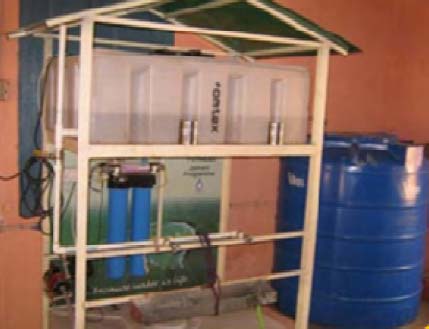Centre For Media Studies(CMS)
Assessment of Jalamani programme on stand alone water purification systems in rural India - A report by Centre for Media Studies
Posted on 03 Sep, 2011 04:50 PM This report by the Centre for Media Studies, New Delhi presents an assessment of the Jalamani programme of the Department of Drinking Water Supply, Government of India. The centrally sponsored programme commenced in 2008-09 aimed at installing simple Stand Alone Water Purification Systems (SAWPS) in rural schools to enable school children to have access to safe and clean water. The focus was on tackling bacteriological contamination and turbidity in ongoing rural drinking water supply programme.
This report by the Centre for Media Studies, New Delhi presents an assessment of the Jalamani programme of the Department of Drinking Water Supply, Government of India. The centrally sponsored programme commenced in 2008-09 aimed at installing simple Stand Alone Water Purification Systems (SAWPS) in rural schools to enable school children to have access to safe and clean water. The focus was on tackling bacteriological contamination and turbidity in ongoing rural drinking water supply programme.
The assessment study used both qualitative and quantitative techniques such as focus group discussions and in-depth interviews besides structured questionnaire for a variety of stakeholders and research questions. Another important aspect of the quantitative tools was testing of the raw and treated water samples. The study was undertaken in 320 schools spread across 20 districts and six states.
TII-CMS India Corruption Study 2007 : Water supply services scenario
Posted on 07 Jul, 2008 09:08 AMBelow Poverty Line (BPL) households in India are made to cough up about Rs 9,000 million as bribe to avail basic and need based public services. The TII-CMS India Corruption Study 2007 focused on BPL households, mostly in rural India. The coverage of this study includes all parts of the country. The study, like the earlier ones is based on CMS-PEE model where the scope is not only limited to perceptions about corruption in general, but perception in specific context of a service and, more importantly, actual experience of paying bribe by BPL households in availing one or more of the 11 selected public services. Depending on frequency of interaction, the eleven services are divided broadly into "basic services" (PDS, Hospital Service, School Education (up to 12th), Electricity Service and Water Supply Service) and "need based services" (Land Records / Registration, Housing Service, Forest, NREGS, Banking Service and Police Service (traffic and crime). This round of India Corruption Study 2007 is designed and conducted by Centre For Media Studies(CMS) in collaboration with the Transparency International India (TII). The CMS methodology for the study involved household level sample survey, exit interviews at service delivery outlets, discussions with the concerned "service providers"in each case and observations on display of information at the service delivery points. Read more on the Corruption Study's take on the Water Supply Services in India
